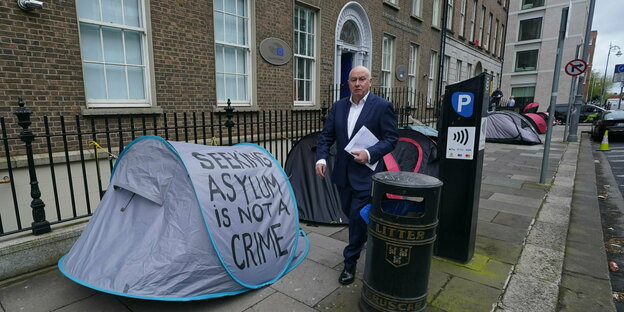Since the British plan for Rwanda, more and more asylum seekers are seeking refuge in Ireland. The Irish government wants to change that and is taking on London.

Due to the British plan for Rwanda: more and more people are seeking asylum in Ireland Photo: Niall Carson/dpa
British Prime Minister Rishi Sunak was pleased that the plan to send asylum seekers to Rwanda was bearing fruit. Thousands of people have already left the country, towards Ireland via Northern Ireland, across Ireland's internal land border.
We will not accept returns from the European Union via Ireland if the EU does not accept returns to France.
The Dublin government now wants to put an end to this situation. On Tuesday it passed emergency legislation that would classify the UK as a “safe country” for asylum seekers to be returned. Sunak, in turn, has said that he will not accept them.
“I was not interested in a deal with Dublin,” he said in an interview with ITV: “We will not accept returns from the European Union through Ireland if the EU does not accept returns to France, where the illegal immigrants come from. Of course not. We will do that.”
British Home Secretary James Cleverly canceled a meeting with Ireland's Justice Minister Helen McEntee, and in return she canceled her planned trip to London for talks.
Northern Ireland Minister Chris Heaton-Harris and Irish Deputy Prime Minister Micheál Martin attempted to downplay the dispute at a meeting in London on Monday. “We will of course follow all of this very closely and continue to work with the Irish government on these matters,” Heaton-Harris said, adding that “we certainly don't want to disrupt our relations with Ireland.”
Ireland notices changes in migration patterns
The High Court in Dublin blocked the repatriation of asylum seekers from the UK in March. The reason was concern about the British government's plan to send asylum seekers to Rwanda. With the emergency law, the court's ruling is no longer valid.
Justice Secretary McEntee said last week that more than 80 per cent of people seeking asylum in Ireland come from the UK via Northern Ireland. Martin reduced that a bit on Tuesday. “It's not a statistic, a database or an evidence base,” he said. “But there has been a change in the migration pattern.”
The figures show it in the first three months of this year, 4,715 people requested asylum directly at the International Protection Office in Dublin, compared to 420 people who requested it at airports or sea ports. Five years ago the ratio was 1:1, last year it was 4:1 and now it is 10:1. However, as there are no border controls between Northern Ireland and Ireland because an open border was a priority in the Brexit negotiations, the figures are estimates.
The dispute between Dublin and London intensifies
The Dublin government says the significant drop in the number of applicants at airports is due to the success of measures such as stricter enforcement of airline liability obligations and fast-track processing of applications from safe countries. For example, the number of applicants from Georgia has decreased significantly.
The diplomatic conflict between Dublin and London is aggravated by the emergency law. Both Sunak and Cleverly believe the issue is an Irish problem. After all, the Dublin government insisted on an open border during the Brexit negotiations. Britain is therefore not obliged to take back asylum seekers.
However, Irish Prime Minister Simon Harris stated that the emergency legislation simply gives legal force to an agreement that has existed with the United Kingdom since 2020: “We are simply providing legal clarity around this agreement, allowing us to classify to the United Kingdom as a safe country.”
